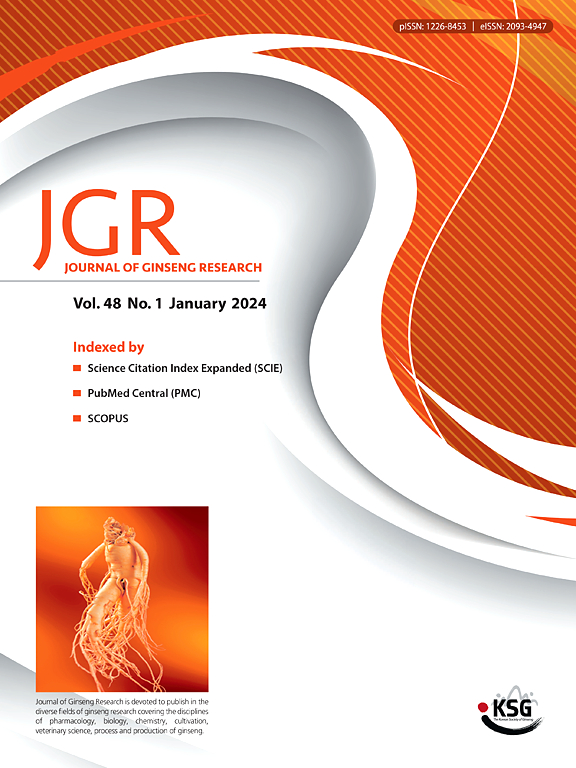人参:阿尔茨海默病中淀粉样蛋白、tau病理学和认知功能的调节剂
IF 5.6
2区 医学
Q1 CHEMISTRY, MEDICINAL
引用次数: 0
摘要
阿尔茨海默病(AD)是痴呆症的主要原因,其特征是存在β -淀粉样蛋白(Aβ)斑块,tau过度磷酸化和认知能力下降。尽管a β靶向治疗取得了进展,但阿尔茨海默病的多面性强调了补充治疗的必要性。人参以其增强认知能力的特性而闻名,已证明在解决AD病理方面具有潜力。本文系统地探讨了人参及其生物活性皂苷的治疗潜力,重点介绍了它们对Aβ、tau蛋白和认知功能的影响。我们总结了临床前和临床研究的结果,强调了神经保护机制,如抑制Aβ产生,增强Aβ清除和抑制tau过度磷酸化。研究表明,人参及其生物活性人参皂苷具有改善AD模型认知功能的潜力。临床研究进一步表明,它对轻度认知障碍、主观记忆障碍和AD的辅助治疗具有认知益处,对缺乏载脂蛋白ε4等位基因的个体效果尤其显著。本文综述了人参作为阿尔茨海默病的治疗和预防药物的潜力,强调了进一步探索人参衍生化合物以优化其疗效和临床应用的科学基础。本文章由计算机程序翻译,如有差异,请以英文原文为准。

Panax ginseng: A modulator of amyloid, tau pathology, and cognitive function in Alzheimer's disease
Alzheimer's disease (AD), the leading cause of dementia, is characterized by the presence of beta-amyloid (Aβ) plaques, tau hyperphosphorylation, and cognitive decline. Despite advancements in Aβ-targeting therapies, the multifaceted nature of AD underscores the need for complementary treatments. Panax ginseng, renowned for its cognitive-enhancing properties, has demonstrated potential in addressing AD pathology. This review systematically explores the therapeutic potential of P. ginseng and its bioactive ginsenosides, focusing on their effects on Aβ, tau proteins, and cognitive function. We summarize the findings from preclinical and clinical studies, highlighting neuroprotective mechanisms, such as the inhibition of Aβ production, enhanced Aβ clearance, and suppression of tau hyperphosphorylation. Research on P. ginseng and its bioactive ginsenosides has shown potential for improving cognitive function in AD models. Clinical studies further suggest its cognitive benefits in mild cognitive impairment, subjective memory impairment, and as adjunctive therapy in AD, with particularly pronounced effects in individuals lacking apolipoprotein ε4 allele. This review provides a comprehensive overview of the potential of P. ginseng as both a therapeutic and preventive agent for AD, highlighting the scientific basis for further exploration of P. ginseng-derived compounds to optimize their efficacy and clinical application.
求助全文
通过发布文献求助,成功后即可免费获取论文全文。
去求助
来源期刊

Journal of Ginseng Research
CHEMISTRY, MEDICINAL-INTEGRATIVE & COMPLEMENTARY MEDICINE
CiteScore
11.40
自引率
9.50%
发文量
111
审稿时长
6-12 weeks
期刊介绍:
Journal of Ginseng Research (JGR) is an official, open access journal of the Korean Society of Ginseng and is the only international journal publishing scholarly reports on ginseng research in the world. The journal is a bimonthly peer-reviewed publication featuring high-quality studies related to basic, pre-clinical, and clinical researches on ginseng to reflect recent progresses in ginseng research.
JGR publishes papers, either experimental or theoretical, that advance our understanding of ginseng science, including plant sciences, biology, chemistry, pharmacology, toxicology, pharmacokinetics, veterinary medicine, biochemistry, manufacture, and clinical study of ginseng since 1976. It also includes the new paradigm of integrative research, covering alternative medicinal approaches. Article types considered for publication include review articles, original research articles, and brief reports.
JGR helps researchers to understand mechanisms for traditional efficacy of ginseng and to put their clinical evidence together. It provides balanced information on basic science and clinical applications to researchers, manufacturers, practitioners, teachers, scholars, and medical doctors.
 求助内容:
求助内容: 应助结果提醒方式:
应助结果提醒方式:


